Small and midsize business leaders, this blog post is for you.
There’s an overwhelming number of options when it comes to marketing your business, right? And on top of the myriad options, there’s the challenge of choosing those that are best for your company.
No one likes to waste money and time, and that can easily happen when it comes to marketing.
This blog post should give you some ideas for your current digital marketing strategy, or validate initiatives you are already invested in.

With that said, let’s begin!
Note: This info is focused on B2B digital marketing (business-to-business), but that doesn’t mean you won’t find this list insightful if your company is B2C!
Here is our list of B2B digital marketing recommendations, broken down into tiers:
Tier 1 Digital Marketing Initiatives
- Content Marketing & SEO
- Email Marketing
- Website Design / Growth / Performance
Tier 2 Digital Marketing Initiatives
- Google Ads
- Marketing Automation
- Webinars
Tier 3 Digital Marketing Initiatives
- Paid Social
- Podcasting
- Leveraging AI
Let’s talk about each of these in some detail.
Tier 1 Digital Marketing Initiatives (Go All In)
The digital marketing initiatives that fall under this tier are ones we consider to be the most valuable, generally speaking. If you are only going to do a few initiatives mentioned in this blog post, it is probably best to pick the ones from this tier.
1. Content Marketing & SEO
Content marketing and SEO continue to serve B2B companies well. For many businesses, it would be a mistake to not consistently create content to help market your company. Content types like video, blog posts, informational pages, eGuides and eBooks, and graphics frequently pay dividends.
The key, of course, is to create helpful material that also has your company’s unique touch.
Closely associated with creating content is SEO. Despite what all of the AI obsessives are saying about search moving entirely to new technologies like ChatGPT, I’m still a believer in the value of Google Search and of creating insightful and properly formatted content to generate organic website traffic.
The positive impact of quality organic search traffic to your website cannot be overstated!
SEO & content marketing is one of the primary ways our company helps others succeed online, and we continue to see significant gains being made.
2. Email Marketing
Email marketing remains a steadfast digital marketing investment for many businesses. And consumers continue to digest content via email. Here’s an interesting, related stat: “77% of marketers have seen an increase in email engagement over the last 12 months”, per HubSpot.
Executing a sound email marketing strategy is fairly straightforward. Create good content, whether that be a blog post, informational page on your website, downloadable piece of content like an e-Guide, and send it to people at well-chosen times.

When email marketing is part of your organization’s digital marketing strategy, you can also take advantage of marketing automation tools like HubSpot and Marketo to better leverage your content and emails to drive more leads and sales.
What I like most about email marketing is that it is relatively non-intrusive to prospects and buyers, and it is simple and straightforward for both sides.
3. Website Design / Growth / Performance
We highly recommend doing everything you can to make your website as great an asset as possible for your business. Sure, it requires effort and skill, but why not put your best foot forward?
Your website plays a pivotal role in the impression your company creates. Whether it is someone stumbling upon it for the first time through SEO or someone visiting your website after connecting with you at a conference or happy hour, you want to make those impressions count.
Be sure to get your website performing extremely well. Fast load speeds play a major role in SEO results and user experience. Publish great content on your website as frequently as possible. Ensure your website’s formatting is error-free on all devices, especially mobile.
All of these factors are instrumental in creating a positive experience for people to learn more about your company and inquire about your products and services, as well as for achieving strong SEO results.
4. Social Media
While we are not a social-media diehards here at Demand Thrive, it is obvious that social media is valuable for companies.
We recommend two objectives when it comes to social media…post your content on your channels as much as you can, and try to engage with as many people as possible on the platform. If someone is commenting on your posts, reach out to them. If someone is retweeting your content all the time, reach out to them.
Focus on using social media as a platform for promoting your content and engaging with customers.
Tier 2 Digital Marketing Initiatives
1. Google Ads
To kick off our Tier 2 digital marketing initiatives, let’s start with Google Advertising.
Google Ads is really valuable because you can reach people who are already showing intent in what you are selling or providing. Not many other digital marketing channels can boast this!
When someone sees a Facebook ad for a product or service, they are not necessarily in the market for that product/service. In contrast, when someone sees an advertisement in a Google Search Results Page, they are very often in the market. With Google Ads, the idea is to meet a potential buyer with an offering quickly and smoothly.
I have also seen the power of Google Ads…one client that had to pause ads during the fall of 2020 because we were getting so many good leads, and the client did not have enough staff at the time to take on the additional work!
Things don’t always work that way, but Google Advertising certainly belongs in this blog post, and I think it makes the most sense at Tier 2, as it can be incredibly valuable but not necessarily vital for B2B companies.
Our company is a certified Google Partner, meaning we have met a certain level of ad spend that we manage on behalf of clients as well as have met the Google Ads certification requirements. If you need help with advertising on Google, contact us!
2. Marketing Automation
Marketing automation helps you automate marketing tasks so that you can save time and generate more revenue. The platforms integrate with various CRMs, so you can see your prospects’ data all in one place and focus on sending them valuable content at the right time. You can also track a lead’s behavior on your website and give them a “lead score”, aiding sales teams in their relationship-building and deal-making.
Marketing automation is closely tied to email marketing. If you invest in email marketing, it is a good idea to consider investing in a marketing automation platform. If you are a small business, Hubspot is probably the best move. If your company is bigger, Marketo is outstanding.

This is a bit of a big step for most small businesses, but it is often worth it. If you need help with marketing automation, especially with Marketo, contact us today.
3. Webinars
Incorporating webinars into your digital marketing is an interesting avenue to explore if you haven’t already. A lot of companies regularly do webinars and have been doing so for years.
Here are a couple of stats on webinars that stand out to us, courtesy of Demand Sage:
- “95% of organizations say the webinar is a vital strategy for their marketing”
- “The global webinar market is expected to grow at a CAGR of 8% from 2023 to 2035”
Webinars could be a great investment for your company’s marketing.
Tier 3 Digital Marketing Initiatives (Bonus)
1. Paid Social
Paid social, like LinkedIn/Facebook/Twitter ads, are another good avenue for B2B companies to explore. Paid ads often make more sense for B2C companies (think about a clothing company advertising on Instagram or a landscaping company advertising on Facebook), but exploring these platforms, particularly LinkedIn and Twitter for ads, is worthwhile.
2. Podcasting
Podcasting could be a great additional marketing channel for your company to explore. According to a MarTech article from last fall, podcasts “are now a top channel for B2B content, with 43% of decision makers saying they use them to get business related content.”
I’ve noticed an uptick in podcasts and podcast content on my LinkedIn feeds, especially from smaller companies that have chosen to leverage the channel to establish brand credibility and grow leads.
If you’re interested in learning more about creating a podcast for your B2B organization, check out 18 Expert Tips For Creating A Successful B2B Podcast by Forbes.
3. Leveraging AI
Lastly, it would be wise to leverage artificial intelligence to help boost your B2B digital marketing efforts. You can do so by taking advantage of the some of the built-in AI capabilities of tools like marketing automation platforms (Marketo, HubSpot, etc.), as well as using generative AI tools like Adobe Firefly.
Also consider using a tool like ChatGPT to help generate ideas for content and promotional materials.

